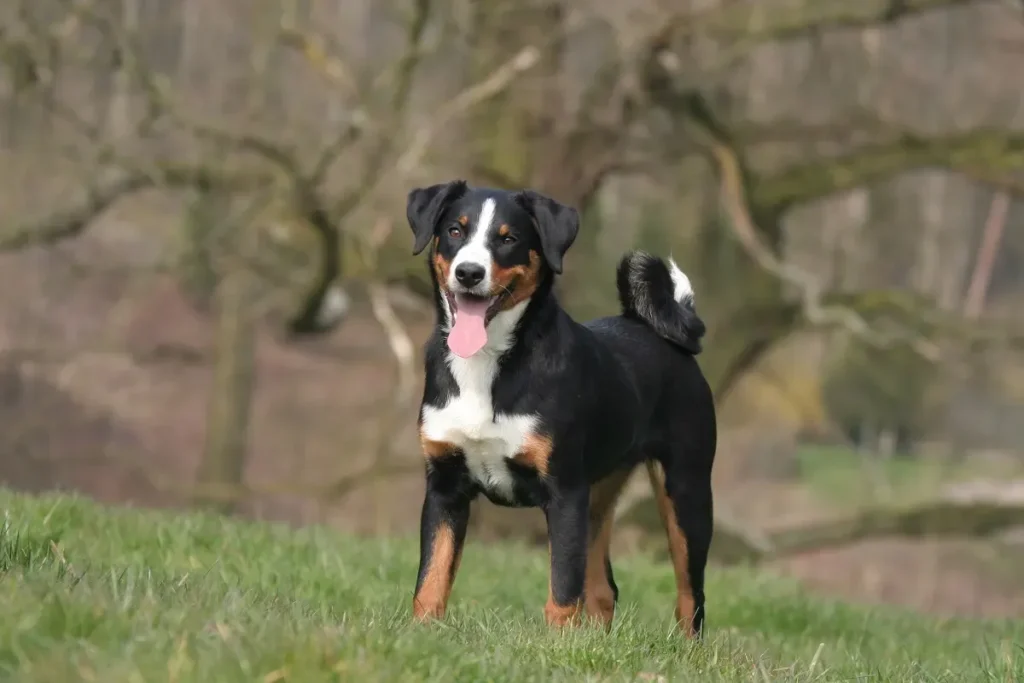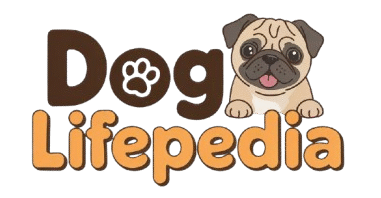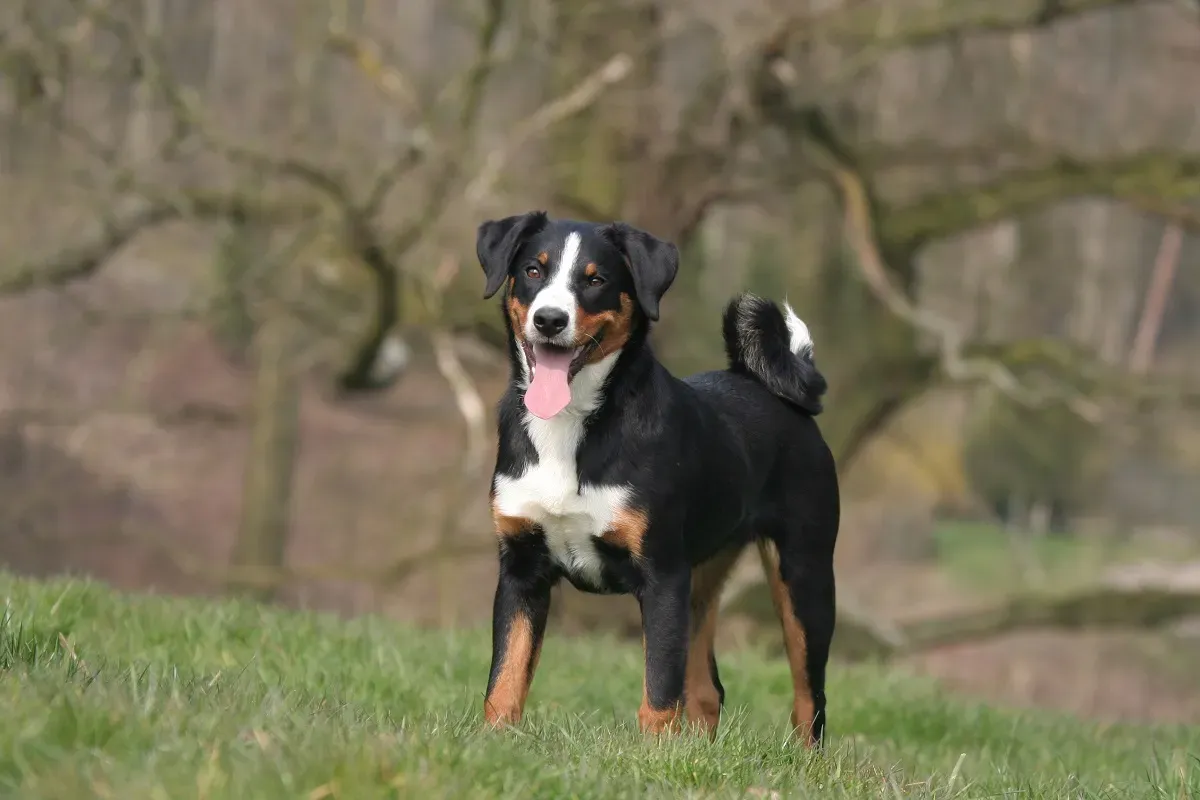
Appenzeller Sennenhund
Heena
June 25, 2025

The Appenzeller Sennenhund is a rare but remarkable breed hailing from the picturesque Swiss Alps. Known for its high energy, intelligence, and unmatched work ethic, this breed is one of the four Swiss Mountain Dogs and excels as a herding, guard, and companion dog.
With its loyal personality, striking tri-color coat, and unmatched agility, the Appenzeller makes a devoted family companion—especially for active households with space to run and a job to do.
🐶 Quick Facts: Appenzeller Sennenhund at a Glance
Trait | Description |
Origin | Switzerland |
Breed Group | Working Group (not yet AKC-recognized, FCI-recognized) |
Size | Medium |
Weight | 48–70 lbs (22–32 kg) |
Height | 18–23 inches (46–58 cm) |
Lifespan | 12–15 years |
Coat Type | Short, dense double coat |
Colors | Black or brown base with rust and white markings |
Temperament | Energetic, loyal, alert, protective |
Energy Level | Very High |
Good with Kids | Yes, with early socialization |
Trainability | High (but needs consistent leadership) |
Shedding Level | Moderate to High |
🧬 History & Origin
The Appenzeller Sennenhund has ancient roots in Switzerland, particularly in the Appenzell region, where it was bred as a multi-purpose farm dog. It helped herd livestock, pulled carts, guarded property, and worked closely with Swiss farmers in mountainous terrain.
It is one of four native Swiss mountain breeds, alongside:
- Greater Swiss Mountain Dog
- Bernese Mountain Dog
- Entlebucher Mountain Dog
Official recognition of the breed began in the late 1800s, with structured breeding programs started in the 20th century to preserve its characteristics. Today, it’s still rare outside Switzerland, but slowly gaining popularity in working-dog and sporting-dog circles worldwide.
🐕 Appearance
The Appenzeller is a compact and muscular dog, known for its tri-color markings and expressive, intelligent eyes.
Key Physical Features:
- Head: Strong and flat on top
- Eyes: Dark, almond-shaped, alert expression
- Ears: Medium-sized, triangular, and set high
- Body: Sturdy, well-balanced, and athletic
- Tail: Carried high in a distinctive ring (curled over back)
- Coat: Dense, glossy double coat—weather-resistant
- Coloring: Black or brown base with symmetrical rust and white markings on chest, legs, and face
This breed’s appearance reflects its robust mountain heritage—built for endurance, strength, and agility.
💬 Temperament
The Appenzeller Sennenhund is loyal, bold, and extremely intelligent. It thrives in environments where it has purpose and routine, and can be protective of its home and family.
Common Personality Traits:
- Loyal: Forms strong bonds with family members
- Energetic: Always ready for action, play, or work
- Protective: Makes an excellent watchdog
- Confident: Bold, fearless, and assertive when needed
- Social (with training): Tends to be reserved with strangers, but warms up with time
While not inherently aggressive, the breed needs early socialization to ensure it’s comfortable around children, other dogs, and unfamiliar people.
🏃 Exercise and Activity Needs
This breed has exceptionally high energy levels and a strong work drive. It’s not suitable for apartment living or sedentary households.
Ideal Activities:
- Herding tasks or dog sports (agility, tracking)
- Long daily walks, jogs, or hikes
- Training in obedience, rally, or scent work
- Play sessions in large, fenced areas
They need at least 1.5 to 2 hours of activity per day. Without proper physical and mental stimulation, they can develop behavioral issues like barking, digging, or restlessness.
🧼 Grooming and Maintenance
Despite their double coat, Appenzellers are relatively low-maintenance in terms of grooming.
Grooming Tips:
- Brush weekly to manage shedding and keep coat shiny
- Bathe occasionally or when dirty (not frequently needed)
- Check ears regularly for dirt and wax buildup
- Trim nails monthly
- Brush teeth 2–3 times a week
They shed year-round, with heavier shedding during spring and fall.
🎓 Training and Intelligence
The Appenzeller Sennenhund is intelligent, eager to work, and quick to learn, but can be willful. They require firm, consistent training and do best with experienced dog owners.
Training Advice:
- Start obedience training and socialization early
- Use positive reinforcement techniques (treats, praise, toys)
- Set clear boundaries and routines
- Include problem-solving games and jobs
- Avoid harsh punishment—it can lead to fear or mistrust
They’re excellent in agility, herding trials, obedience competitions, and make great partners for active lifestyles.
🏥 Health and Lifespan
The Appenzeller Sennenhund is a generally robust and healthy breed, but as with all purebred dogs, they may be predisposed to certain genetic conditions.
Common Health Concerns:
- Hip dysplasia
- Elbow dysplasia
- Eye conditions (e.g., cataracts, PRA)
- Bloating (gastric torsion)
- Allergies (rare but possible)
Average Lifespan:
12 to 15 years, with proper nutrition, exercise, and veterinary care.
👪 Is the Appenzeller Sennenhund Right for You?
This breed is ideal for active individuals, working farms, or outdoorsy families who want a loyal, energetic dog that can be both a protector and companion.
✅ Best Suited For:
- Families with large fenced yards or farms
- Active owners who love hiking, running, or herding
- People looking for a protective yet affectionate pet
- Experienced dog owners who understand working breeds
❌ Not Ideal For:
- Apartment dwellers
- First-time dog owners
- Families with very young children (without supervision/training)
- Sedentary households or part-time owners
📝 Final Thoughts
The Appenzeller Sennenhund is a rare gem among working breeds—brimming with personality, energy, and devotion. With the right owner, this dog will guard your home, work beside you tirelessly, and become an irreplaceable part of your family.
If you’re seeking a hard-working, active, and fiercely loyal dog, the Appenzeller may be the perfect fit.
FAQ
Is the Appenzeller Sennenhund a good family dog?
Yes—when properly trained and socialized, they are loyal, protective, and great with children.
Can they live indoors?
They can live indoors, but they need daily outdoor time to burn energy and stay balanced.
Are they good with other pets?
Yes, especially if raised with them. However, they may try to herd smaller animals due to instinct.
Is this breed easy to train?
Yes, if training starts early and is consistent. They respond best to confident, calm leadership.
Choose this breed if you want:
- A powerful, dignified protector
- A dog that’s intelligent, trainable, and loyal
- A companion for active households
- A breed with a strong work ethic and calm demeanor
Avoid if you want:
- A low-maintenance or small dog
- An easygoing, independent breed
A breed suitable for apartment living with minimal time commitment

